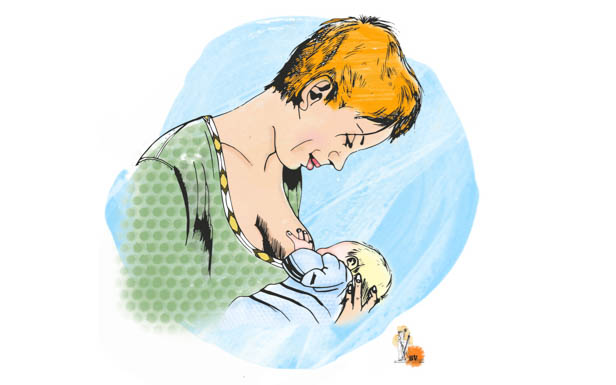Breastfeeding Is Challenged

Breastfeeding has been around since the beginning of mankind and has helped ensure the survival of the human race thus far. So why is breastfeeding challenged today in so many different ways?
…Mothers are questioned about the importance of breastfeeding and even about the need to breastfeed.
…Well-meaning advice from various sources makes mothers doubt their ability to breastfeed their babies.
…The medical profession does not always encourage breastfeeding, and often doctors insinuate that there are perfectly good substitutes which could give the mother more freedom and prove less tiring for her.
…There is a large market for nursing teas and other nursing aids, giving the impression that breastfeeding is a kind of handicap and that breastfeeding women need to be helped.
…The need of many mothers to return to work leads them to think that there is not much point in even getting started with breastfeeding; and, in spite of legislation, many companies throw obstacles in the way of working breastfeeding mothers: e.g., no appropriate facilities to pump, or not enough time given to do so.
…The press regularly comes up with reports on contaminants found in breast milk, implying that breast milk could be dangerous for babies.
Thus I found it encouraging to read about a recent study carried out by the Hong Kong Polytechnic University. Many local mothers had expressed worry about having inadequate nutrient levels in their milk, and local healthcare professionals lacked information about breast milk composition for local mothers in their daily practices. In light of this, the study was set up to establish the diet and the nutritional content of the breast milk of local women, so as to analyze how daily diet affects the nutritional composition of breast milk.
In a first step, levels of the polyunsaturated fatty acids DHA, EPA, and AA, which help brain and vision development, were evaluated. The study confirmed that breast milk contains adequate levels of DHA for children aged 0 to 36 months, and that the average daily dietary intake of DHA+EPA of the mothers participating in the study exceeded the minimum Chinese daily recommended intake level, independent of whether the mother had taken supplement, thus showing the benefit of eating a balanced diet.
Mr. Gordon Cheung, registered dietician and project fellow of the Food Safety and Technology Research Centre under PolyU’s Department of Applied Biology and Chemical Technology, suggests that breastfeeding mothers eat an adequate amount of meat, fish, eggs or their alternatives, and foods rich in iodine and calcium to develop a healthy lactating diet, which can in turn enrich nutrients in breast milk to support infant growth. His colleague Dr. Wong Man-sau, associate professor of PolyU’s Department of Applied Biology and Chemical Technology and Deputy Director of Food Safety and Technology Research Centre, goes further to state that, “Our research results reveal that the breast milk in Hong Kong’s lactating mothers can meet the growing needs of infants in Omega-3 fatty acids. As a result, we strongly urge mothers to consider breastfeeding. Not only does it serve as a food source for infants, it helps develop the mother-child relationship, allowing children to grow happily and healthily.”
The second phase of the study will test the levels of the essential element calcium and trace elements zinc, iron, iodine and selenium in the breast milk, and will investigate the nutrient level of the diet of the women participating in the study. The results will help the Laboratory for Infant & Child Nutrition build up a more comprehensive breast milk database in Hong Kong, promoting collaboration between academia and the government in providing information on breast milk and mother and infant nutrition to the general public and promoting the advantages of breastfeeding.
In today’s fast moving and technological world, the advantages of breastfeeding are often forgotten or dismissed as being old fashioned, not necessary, and sometimes even impossible to achieve. Mothers are not always given the support and advice they need to get started with breastfeeding and to continue with breastfeeding in the long term, and they are often challenged by friends, family, and even strangers about their wish to breastfeed. Sadly, our cultural environment does not always recognize the short- or long-term advantages of breastfeeding.
Yet breastfeeding is the best foundation for life that a mother can give her baby. It provides optimal nutrition whatever the age of the baby; protection against allergies, obesity, diabetes, cancer, respiratory, cardiac and many other health problems; and a sense of security and stability for bewildered babies shot out into this noisy, busy world. It enhances intelligence and hearing and ensures optimal development of the jaw and facial muscles, and much more.
Furthermore, breastfeeding mothers themselves also benefit. Breastfeeding offers long-term protection against cancer, osteoporosis, and other health problems. Breastfeeding supports a woman’s postpartum hormone system, allowing her body to adjust more easily to post-pregnancy life by enhancing the excretion of hormones that keep her calm and help the womb and other internal organs to return more quickly and easily to their pre-pregnancy states. And of course, these hormones enhance bonding with her baby. In many parts of the world, breastfeeding is the only form of contraception.
So why do we still persist with challenging breastfeeding?
La Leche League Switzerland meetings can be found here.
By Joanna Koch
Joanna is a La Leche League leader, a committed Granny to eight wonderful grandchildren, and proud to be a long-time member of the Mothering Matters Team.
Illustration by Bvisual.
Beth (“BVisual”) graduated from university after studying visual communication, specialising in illustration. She’s has been working as a freelance creative and undertaken projects such as the V&A Illustration Awards in London. Beth has projects involving portraits and editorial illustrations under her artist’s name BVisual – see http://www.bvisual.eu/.



